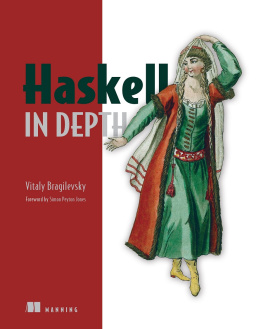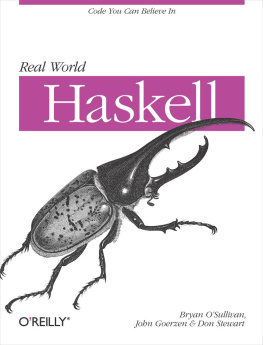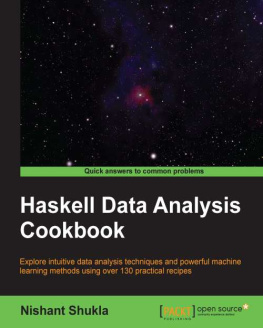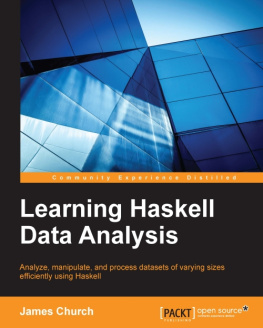Pavel Ryzhov - Haskell Financial Data Modeling and Predictive Analytics
Here you can read online Pavel Ryzhov - Haskell Financial Data Modeling and Predictive Analytics full text of the book (entire story) in english for free. Download pdf and epub, get meaning, cover and reviews about this ebook. year: 2013, publisher: Packt Publishing, genre: Home and family. Description of the work, (preface) as well as reviews are available. Best literature library LitArk.com created for fans of good reading and offers a wide selection of genres:
Romance novel
Science fiction
Adventure
Detective
Science
History
Home and family
Prose
Art
Politics
Computer
Non-fiction
Religion
Business
Children
Humor
Choose a favorite category and find really read worthwhile books. Enjoy immersion in the world of imagination, feel the emotions of the characters or learn something new for yourself, make an fascinating discovery.

- Book:Haskell Financial Data Modeling and Predictive Analytics
- Author:
- Publisher:Packt Publishing
- Genre:
- Year:2013
- Rating:4 / 5
- Favourites:Add to favourites
- Your mark:
Haskell Financial Data Modeling and Predictive Analytics: summary, description and annotation
We offer to read an annotation, description, summary or preface (depends on what the author of the book "Haskell Financial Data Modeling and Predictive Analytics" wrote himself). If you haven't found the necessary information about the book — write in the comments, we will try to find it.
Get an in-depth analysis of financial time series from the perspective of a functional programmer
Overview
- Understand the foundations of financial stochastic processes
- Build robust models quickly and efficiently
- Tackle the complexity of parallel programming
In Detail
Haskell is one of the three most influential functional programming languages available today along with Lisp and Standard ML. When used for financial analysis, you can achieve a much-improved level of prediction and clear problem descriptions.
Haskell Financial Data Modeling and Predictive Analytics is a hands-on guide that employs a mix of theory and practice. Starting with the basics of Haskell, this book walks you through the mathematics involved and how this is implemented in Haskell.
The book starts with an introduction to the Haskell platform and the Glasgow Haskell Compiler (GHC). You will then learn about the basics of high frequency financial data mathematics as well as how to implement these mathematical algorithms in Haskell.
You will also learn about the most popular Haskell libraries and frameworks like Attoparsec, QuickCheck, and HMatrix. You will also become familiar with database access using Yesods Persistence library, allowing you to keep your data organized. The book then moves on to discuss the mathematics of counting processes and autoregressive conditional duration models, which are quite common modeling tools for high frequency tick data. At the end of the book, you will also learn about the volatility prediction technique.
With Haskell Financial Data Modeling and Predictive Analytics, you will learn everything you need to know about financial data modeling and predictive analytics using functional programming in Haskell.
What you will learn from this book
- Learn how to build a FIX protocol parser
- Calibrate counting processes on real data
- Estimate model parameters using the Maximum Likelihood Estimation method
- Use Akaike criterion to choose the best-fit model
- Learn how to perform property-based testing on a generated set of input data
- Calibrate ACD models with the Kalman filter
- Understand parallel programming in Haskell
- Learn more about volatility prediction
Approach
This book is a hands-on guide that teaches readers how to use Haskells tools and libraries to analyze data from real-world sources in an easy-to-understand manner.
Who this book is written for
This book is great for developers who are new to financial data modeling using Haskell. A basic knowledge of functional programming is not required but will be useful. An interest in high frequency finance is essential.
Pavel Ryzhov: author's other books
Who wrote Haskell Financial Data Modeling and Predictive Analytics? Find out the surname, the name of the author of the book and a list of all author's works by series.





![Will Kurt [Will Kurt] - Get Programming with Haskell](/uploads/posts/book/116897/thumbs/will-kurt-will-kurt-get-programming-with-haskell.jpg)




